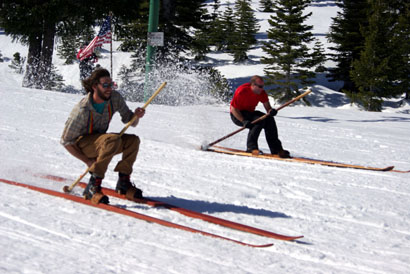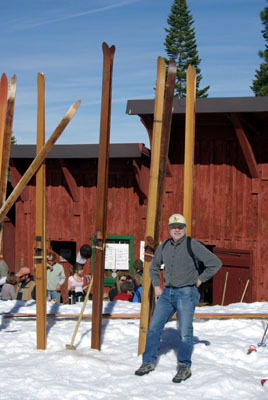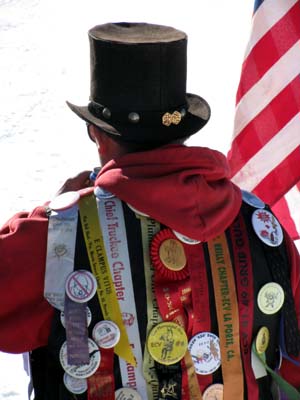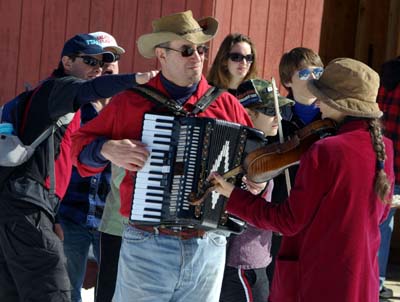

Johnsville, California (Plumas County, California)
Picture racing down a slope at over 80 miles per hour balanced on 14 foot edgeless skis that can't turn or stop, while holding a long pole which you stick between your legs to use as your only brake. That's what some daredevil California Gold Miners who invented the sport of downhill racing did back in the 1850s, in the wilds of Plumas County, long before organized ski racing took root in Scandinavia or the Alps.
Each year, the Historic Longboard Revival Series recreates this quirky part of California history at the spot where it began, on a hill in Plumas County, California. Held the third Sunday of January, February and March at the bucolic Eureka Bowl in Plumas-Eureka State Park, anyone can come and watch, or if brave enough, enter this crazy competition. (This year the dates ar Jan.16, Feb. 20 and March 20) The races are open to all comers, gray beards and young guns each have an equal chance. (Though exciting, Revival Series skiers do not descend the slopes at breakneck speeds) Racers can pay a small fee to rent Longboard skis, crafted by the Plumas Ski Club, however some people make and bring their own. All racers, male and female, young and old must wear period costume or reasonable facsimile during the event. It's particularly fun seeing women in long skirts charging down the slopes, hooting and hollering.
Adding to the uniquely Californian flair -- the race judges are all "Clampers" or technically, members of the Ancient and Honorable Order of E Clampus Vitus. Clad in bright red and black, this quasi-fraternal organization is still surprisingly popular in Gold Country. The group dates back to the mid-19th Century and ensures that a loose spirit of absurdity is present at all times. "I'll be at the podium, or under it," laughed Clamper Ken Heiman as he cracked open a beer. Heiman, a general contractor in Quincy, the largest town in Plumas County, said "When I moved here in the 70's there were hundreds of people skiing at the Eureka Bowl, but now Arnold wants to shut it down." Due to serious budgetary shortfalls, the future of this California State Park is uncertain.
The Plumas-Eureka State Park is a rustic, old fashioned throwback ski hill to be sure. There are no lifts or amenities of any kind -- but it's still plenty fun. All visitors park on the side of the road and walk up to the ski bowl. Although there used to be a small, operating chair-lift, today there isn't even electricity. Volunteers groom the hill by dragging big rock screens behind snowmobiles. Locals are trying to find a buyer to refurbish the historic place, but as of yet there are no takers. Nonetheless, this family oriented, community driven event draws hundreds every year. Many use the park for sledding, hiking and year-round outdoor activities.
Using massive 12-14 foot Longboard skis, gold miners from rival mining camps raced each other -- straight down. (By comparison, modern racing skis are about six feet in length) The only Longboard racing rules, going back to the mining days are: "No spittin', no cheatin'." Spectators stand along the route and cheer on the competitors while others bring along lounge chairs to watch the action in comfort. "I like the whole sense of community, it's awesome," said Sarah Craggs of nearby Greenville. The lively scene also features old fashioned bands with musicians toting accordions, fiddles, banjos and drums. Usually a few hundred people show and enjoy outdoor barbecues and cold beers while dogs play freely and a few hardy skiers walk up the hill carrying gigantic Longboard skis on their shoulders. Conducted in heats like a drag race on snow, two or three racers line up, and are off at the sound of an old gong. (In the old days, miners raced down this hill in large groups). Flannel shirts flapping and hats flying, the participants occasionally poke or prod each other on the way down. "We've been coming here the last five years to see this," said Susan Granucci from Sacramento, visiting with her family. Today's Longboarders sometimes endure dramatic falls though few serious injuries occur. However it's estimated that the original Longboarders reached downhill speeds up to 87 miles per hour, with spectacular wipeouts. Those speeds were not reached again on skis for another 90 years! These raucous races disappeared with the demise of the great Western mines around the turn of the Twentieth Century. "If we had a chairlift the area would get more revenue," said Kari Hickman from Maybe, California. "But no matter what, the Longboard races will always be here."
Though exciting, Western Longboard racing didn't gain widespread notoriety and was shunned by "sophisticated" Europeans due to the rowdy "uncivilized" nature of the American miners. No doubt the miners' main activities seemed to be working, drinking, fighting and cursing, but they also dared to go straight down, very, very fast. Head to Johnsville to experience the fun, or try your luck on a Longboard, recreating this curious chapter in California history.
Bob Ecker is a Napa, California based travel writer
For More Information: The next Historic Longboard races will take place this winter: Jan. 16th, Feb. 20th and March 20th at the Johnsville's Eureka Bowl in Plumas-Eureka State Park. The Plumas-Eureka State Park is located in Johnsville, Plumas County, California, approximately 230 miles from San Francisco, 126 miles from Sacramento, and 65 miles from Reno or the Lake Tahoe area. Take Highway 89 North, off of I-80 and head towards Graeagle.
Or click here for Plumas Ski Club Information
www.plumascounty.org